Note: I’ve been having unexpected trouble with this blog lately. For some reason, half the images in this post and in some other posts aren’t showing up, at least not on Microsoft Edge. They do seem to be visible on Google Chrome so please use that. The post will make much more sense if you do. If I ever figure out the problem, I’ll fix it.
Television producers Jules Bass and Arthur Rankin Jr. and novelist Charles Dickens are inseparable from the Christmas season in many people’s minds. But few know that they actually collaborated a couple of times.
Well, OK, that’s not exactly true. For one thing, I mean by “collaborated” that Rankin and Bass made two specials, animated in the same style as their Frosty the Snowman, adapted from Charles Dickens. And while Dickens may be inseparable from Christmas in people’s minds, it’s mostly because of one novella he wrote, the immortal A Christmas Carol in Prose. Of his four other “Christmas Books,” only one of them (The Haunted Man and the Ghost’s Bargain) actually has to do with Christmas[1]The Chimes is actually about New Year’s. and none of them are as great as Carol. All of them are written in basically the same style and it’s a wonderful style, but A Christmas Carol is the only one to have a completely satisfying story. As for Rankin/Bass Christmas specials, they’ve definitely defined the holiday for some past generations, though I don’t know if they’re doing so for the current one.
I’ll be honest. I’m much more of a Dickens fan than I am a Rankin/Bass fan. Not that I hate them or anything, but even as a kid, I felt like How the Grinch Stole Christmas and A Charlie Brown Christmas were funnier and had more interesting stories. Still, there’s a place for completely innocent, sincere television aimed at the youngest viewers and it can be amusing to see how crazy Rankin and Bass can be when stretching out the plot of a simple little jingle to make a roughly hour-length story. I mean, who would have guessed that the little drummer boy hated humanity because his parents were brutally killed by Roman soldiers?[2]Didn’t it occur to him that his parents were humans themselves? Wouldn’t it have made more sense for him to just hate Romans? Or that Rudolph had already proved that his shiny red nose was an asset before that foggy Christmas Eve by using it to defeat an abominable snow monster, gaining him the respect of the other reindeer and rendering the main part of the song redundant? Christmas puts me in a forgiving mood, and I’ll usually watch some of these specials when it comes around. (Santa Claus Is Comin’ to Town is probably the best of them.) And I was interested to see how Rankin/Bass would taste when mixed with the flavor of an equally iconic but very different titan of Christmas entertainment.
So, without further ado….
Cricket on the Hearth (1967)
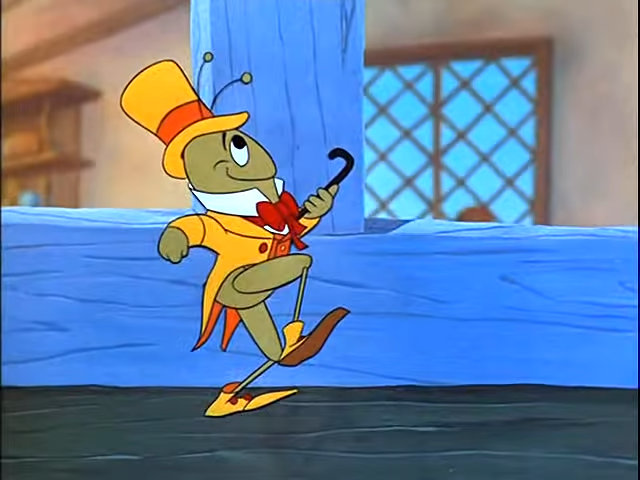
This special begins with the narrator, Crockett Cricket (voiced by Roddy McDowall), telling how he first came to live at the house of humble toymaker, Caleb Plummer (Danny Thomas.) On that very day, he witnessed Caleb’s daughter, Bertha (Danny’s daughter, Marlo) bidding a tearful farewell to her betrothed, Edward Belton (Ed Ames), who is joining the navy.
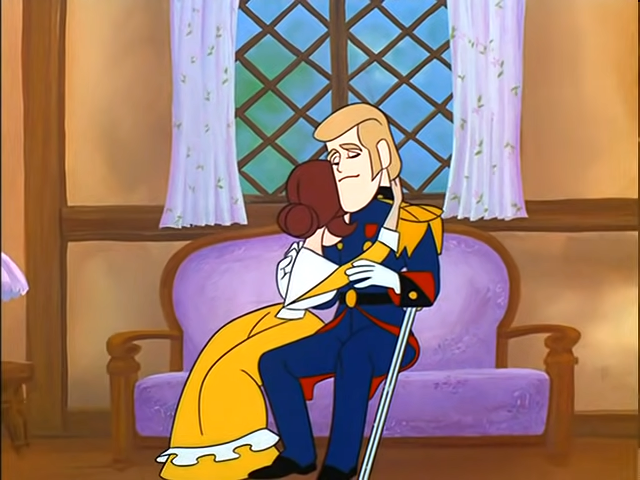
Years later, the Plummers receive word that Edward has been lost at sea. Bertha goes blind from shock(?) and Caleb loses all his money taking care of her. Eventually, his only choice is to accept a miserable position working for evil toy magnate, Tackleton (Hans Conried, entertaining as always.) Caleb takes advantage of Bertha’s blindness to convince her that their wretched new home is actually “splendid” and that their new employer is a kind man-which unfortunately makes her susceptible to Tackleton when he proposes marriage to her.
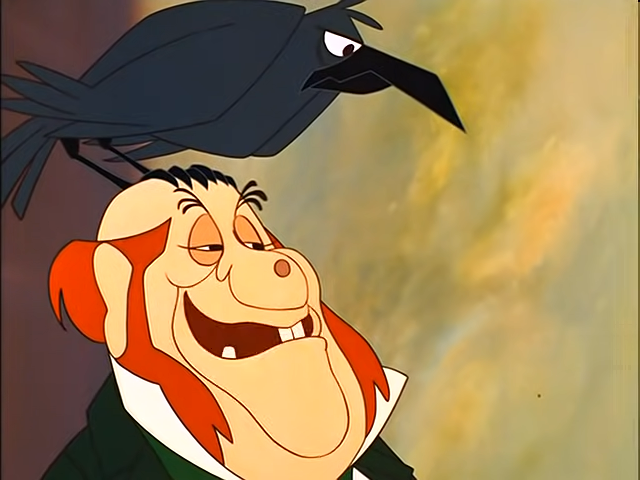
If you’re familiar with Charles Dickens’s 1845 book, The Cricket on the Hearth, which most people aren’t, you’ve already noticed that this special takes huge liberties with the plot. (The credits actually describe the thing as being “suggested by the story of Christmas by Charles Dickens.”) This version of Bertha Plummer is actually a combination of two different characters from the book, the main protagonists of which, John and Mary Peerybingle, don’t appear here at all. That story was mainly about underlying tensions in a seemingly blissful marriage and whether or not the wife was going to cheat on her older husband-none of which made it into this adaptation. In some ways though, this Cricket on the Hearth is darker and more stereotypically “Dickensian” than the literary one. It shows the Plummers’ fall into poverty and their grief over Edward, which were all in the backstory in the book, in some detail. The messenger (Paul Frees) who brings them the bad news is ridiculously ominous too.
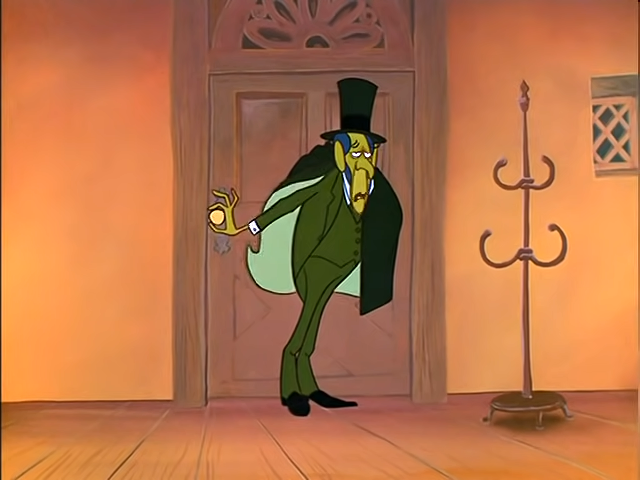
There are even three characters who die though they’re all villains.
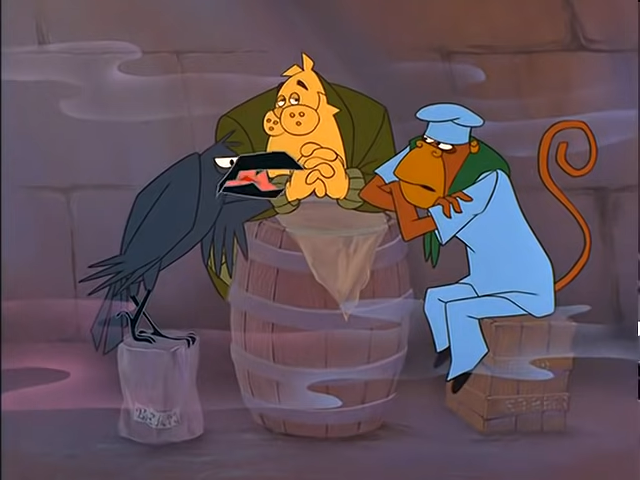
Oh, yes. About that…
The cricket in Charles Dickens’s Cricket on the Hearth wasn’t actually a character, so much as a symbol. The sound of its chirping gave comfort and wisdom to the good characters who listened to it, helping them through the most difficult times. The villainous Tackleton, on the other hand, saw its chirping as a nuisance to be “scrunched.” Crockett Cricket, in this animated special, is a character with human intelligence who actively tries to help Caleb and save Bertha from a terrible marriage. And he’s not the only anthropomorphic animal in the story. Tackleton has a corvine sidekick, Uriah Crow (Paul Frees again), whom he orders to get rid of Crockett when the little insect starts to interfere with his plan. There’s actually an entire tavern for talking animals where Uriah goes to hire some assassins and where we hear a feline chanteuse (Abbe Lane) sing about fish and chips.
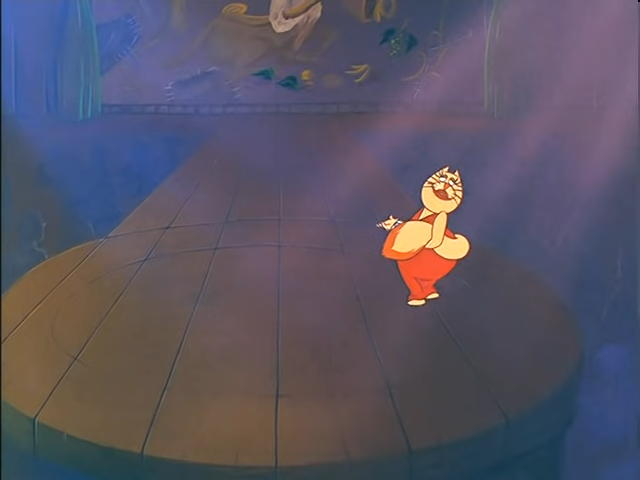
Seriously.
A plot point about toys briefly coming to life at midnight on Christmas Eve isn’t from the source material either but it sounds much more like a Victorian children’s fantasy and if I hadn’t read the book, I would have assumed it came from there.
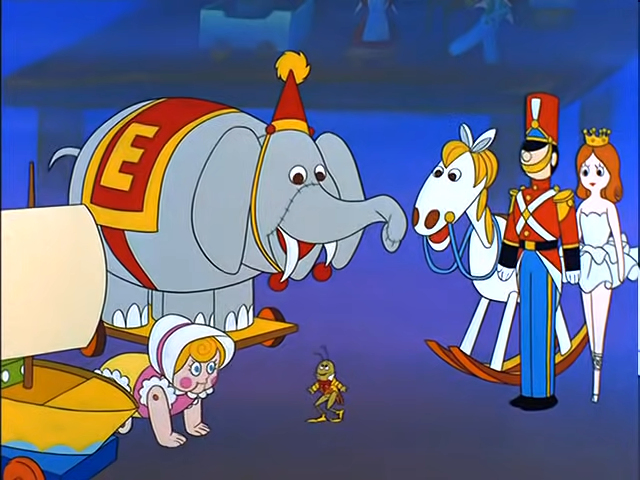
Cricket on the Hearth (1967) is hardly a classic. The reimagined story is kind of a mess. The songs are almost all boring and there are a lot of them. But I can’t find it in my heart to actually dislike it. Like most of Rankin/Bass’s oeuvre, it’s likeable in its corniness. And the combination of Dickens’s sensibility with theirs is…interesting if not always successful. I kind of admire it for not having Bertha’s eyesight be miraculously restored in the end.[3]Compare this to The Story of the First Christmas Snow (1975), another obscure Rankin/Bass special about a blind person. They don’t even explicitly show the Plummers’ financial situation improving though it can be deduced that it will. I remember watching this in the December of 2020 when many families were unable to visit relatives or throw traditional Christmas parties, and the theme of making the most of the season under less-than-ideal circumstances…well, let’s just say it resonated.
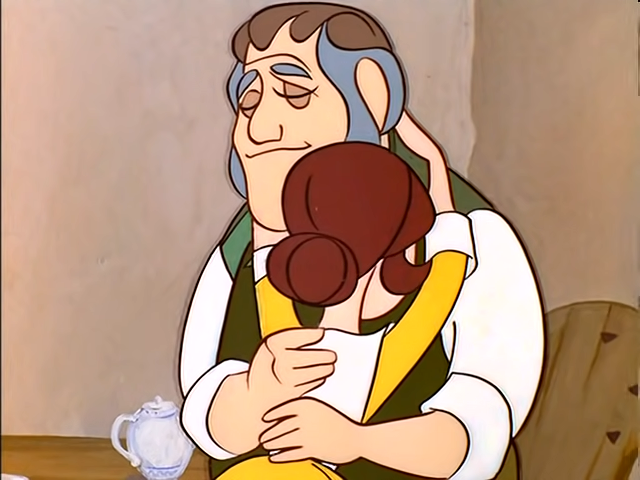
The Stingiest Man in Town (1978)
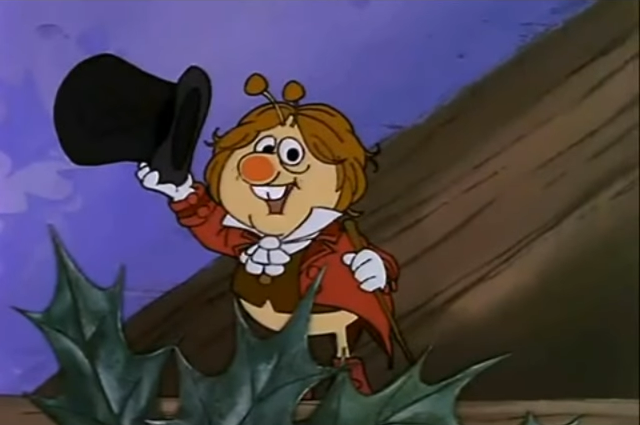
This later Rankin/Bass special, adapted from A Christmas Carol, also begins with an insect (this one voiced by Tom Bosley) introducing himself to the viewers. “Who am I? The London Humbug, of course. B. A. H. Humbug to be precise.” That should give you some idea of the writing for this. It makes me roll my eyes but with a smile on my lips. He welcomes us to the house of Ebenezer Scrooge (Walter Matthau), “the kindest and most generous man in town.” Scrooge wasn’t always so generous, he acknowledges. This transitions to a brief song, a fragment of one really, about how cruel and stingy Scrooge was. “Until the ghosts came,” says Humbug ominously. We then cut to Scrooge’s bedroom, and we get a tantalizing glimpse of Jacob Marley (Theodore Bikel.) Wow, this adaptation moves fast, I thought. But this turns out to be just a teaser. It’s an unconventional way of beginning A Christmas Carol but a very hooky one in my opinion.
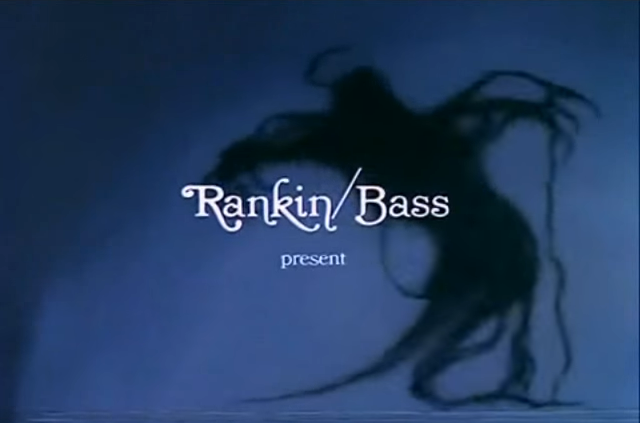
The voice acting throughout is very good, though nobody sounds convincingly British. Walter Matthau, in particular, is good as Scrooge, though he’s not exactly Dickens’s Scrooge. For one thing, he manipulates Bob Cratchit (Sonny Melendrez) by pretending to cry over giving him a paid holiday rather than bluntly objecting to it. Also, he immediately panics over seeing his dead partner’s face in a doorknocker and asks why he has come to haunt him where in the book Scrooge defiantly refused to accept the supernatural until he had no choice. Then again, this doorknocker face is much more frightful than the one Dickens described.

That’s not the only silly moment in this Christmas Carol. There’s also the weirdly abrupt appearance of the Ghost of Christmas Past without any fanfare and how laughably easy it is for Scrooge to lay it to rest, something Dickens describes as quite a struggle in the book.

This is one of the few Rankin/Bass specials to have songs by someone other than Maury Laws. That’s because it’s actually a remake of a 1956 live action special starring Basil Rathbone, which had music by Daniel Spielman and lyrics by Janice Torre. These songs are actually The Stingiest Man‘s secret weapon, even if their number makes it a little crammed, the original special having been considerably longer. The only one I don’t really like is Listen to the Song of the Christmas Spirit and even that one I don’t dislike. I might just be biased against it because it’s sung during a pointless scene of one of the spirits randomly shrinking Scrooge to the size of a bug. (Could Disney’s A Christmas Carol (2009) possibly have been influenced by this?)
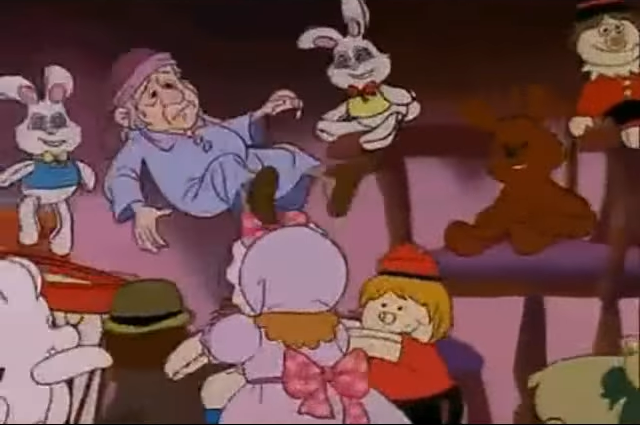
One of the best songs is Humbug, a duet between Scrooge and his nephew (Dennis Day) featuring such great Scrooge-like lyrics as “I abominate Old Saint Nick/His reckless spending makes me sick.” Amusingly, this horrifies Bob Cratchit and B. A. H. Humbug more than anything else he says. This is Rankin/Bass after all.
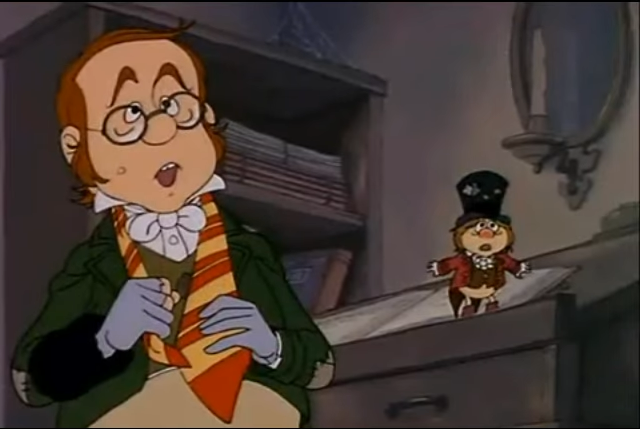
Jacob Marley’s song, I Wear a Chain, is genuinely haunting in a way I don’t expect from this kind of special.
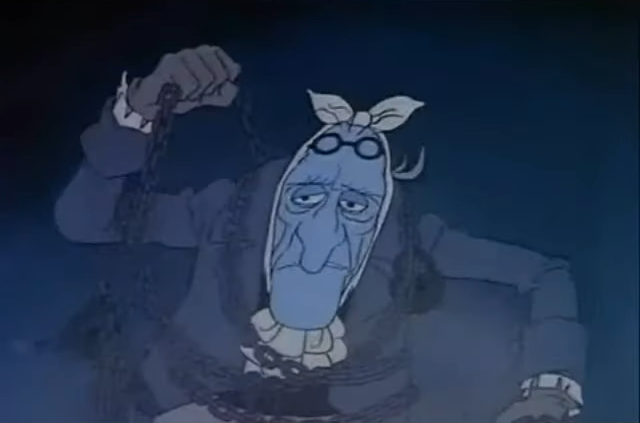
There’s also Yes, There Is a Santa Claus, which is pretty much adapted from Francis Church’s famous response to Virginia. It’s a bit out of left field thematically but pretty, nonetheless.

Then there’s Birthday Party for a King, a song about Jesus which is arguably a bit less out of left field.[4]Some have described A Christmas Carol in Prose as the first secular Christmas story. Others have described it as Christian. The truth probably lies somewhere in between.
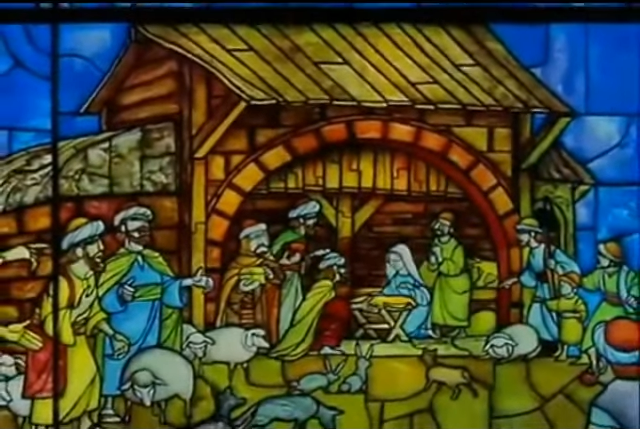
And then there’s One Little Boy, an anti-Malthusian song about Tiny Tim which gets right to the heart of Dickens’s message[5]Thomas Malthus was a controversial economist who worried about population growth. Dickens wrote A Christmas Carol, in part, as a reaction against his ideas. and is the best thing about this adaptation.
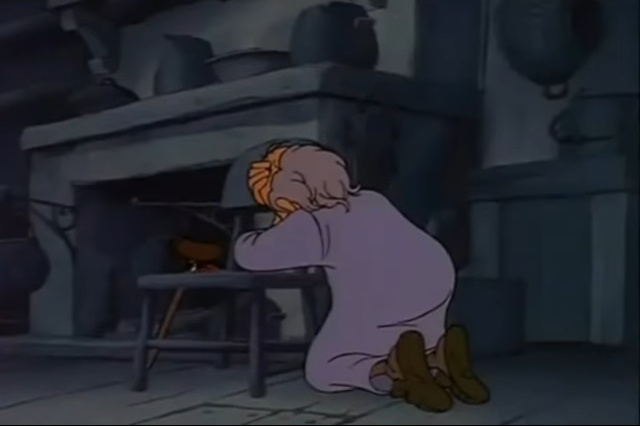
I lied when I wrote above that I consider Santa Claus Is Comin’ to Town (1979) to be the best Rankin/Bass special. Actually, it’s this one since it’s the one I believe has the best story and the most powerful themes. Now is it the best retelling of that story? No, but, granted that its style isn’t exactly Dickensian and that it’s aimed at a somewhat different audience than the book, it’s a fairly honorable retelling and a more than honorable one at its best. Those aforementioned powerful themes are conveyed with a surprising emotional punch.
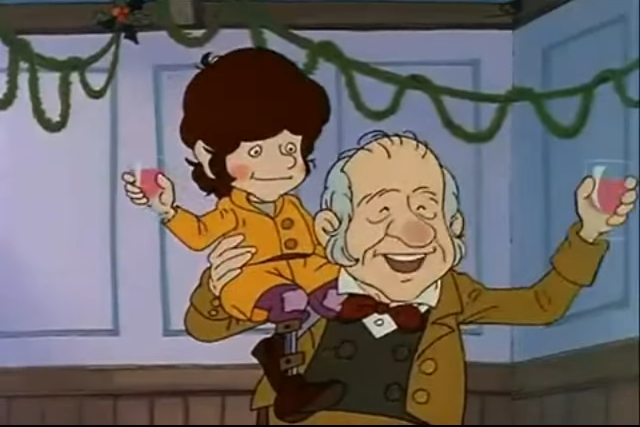
References
| ↑1 | The Chimes is actually about New Year’s. |
|---|---|
| ↑2 | Didn’t it occur to him that his parents were humans themselves? Wouldn’t it have made more sense for him to just hate Romans? |
| ↑3 | Compare this to The Story of the First Christmas Snow (1975), another obscure Rankin/Bass special about a blind person. |
| ↑4 | Some have described A Christmas Carol in Prose as the first secular Christmas story. Others have described it as Christian. The truth probably lies somewhere in between. |
| ↑5 | Thomas Malthus was a controversial economist who worried about population growth. Dickens wrote A Christmas Carol, in part, as a reaction against his ideas. |
